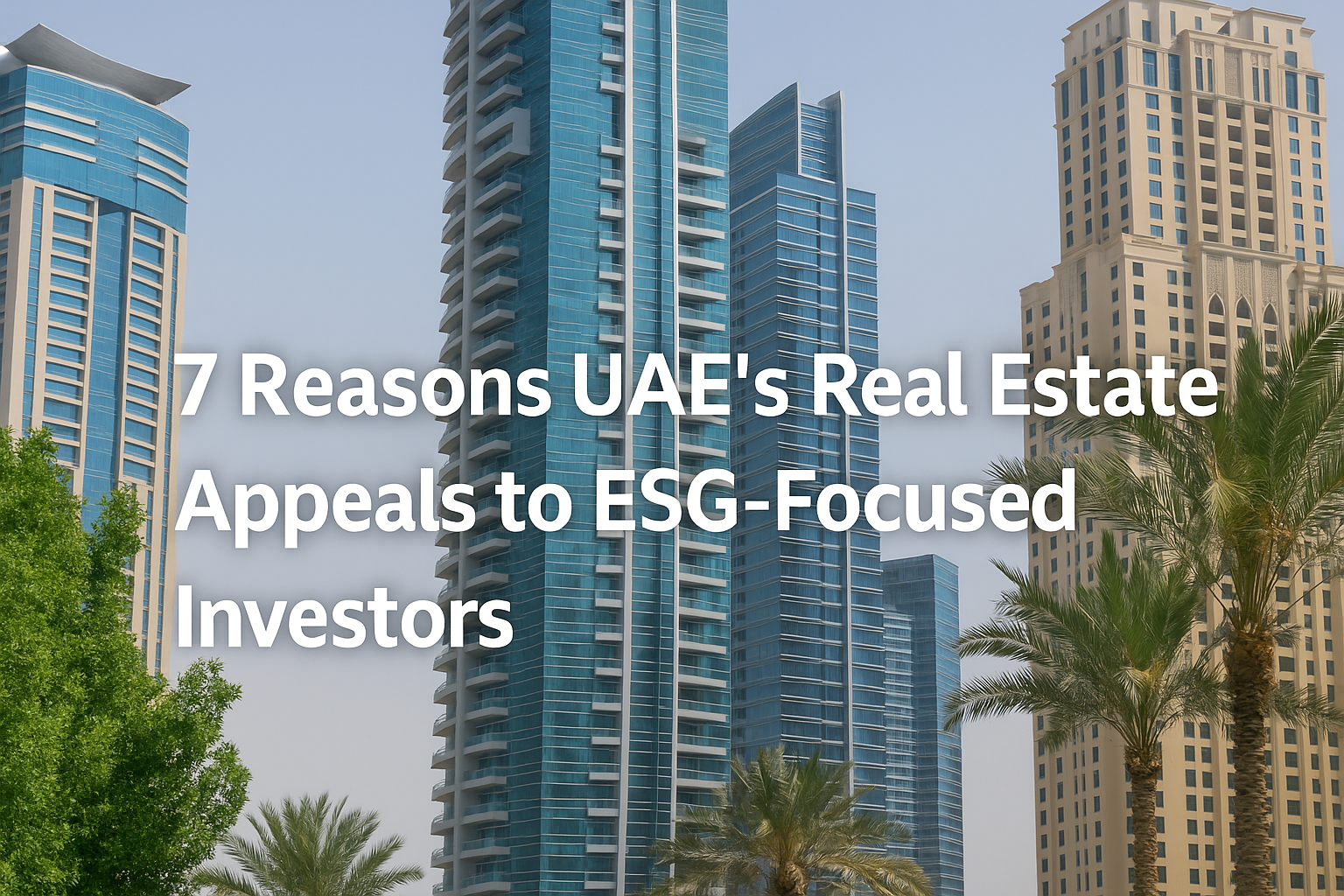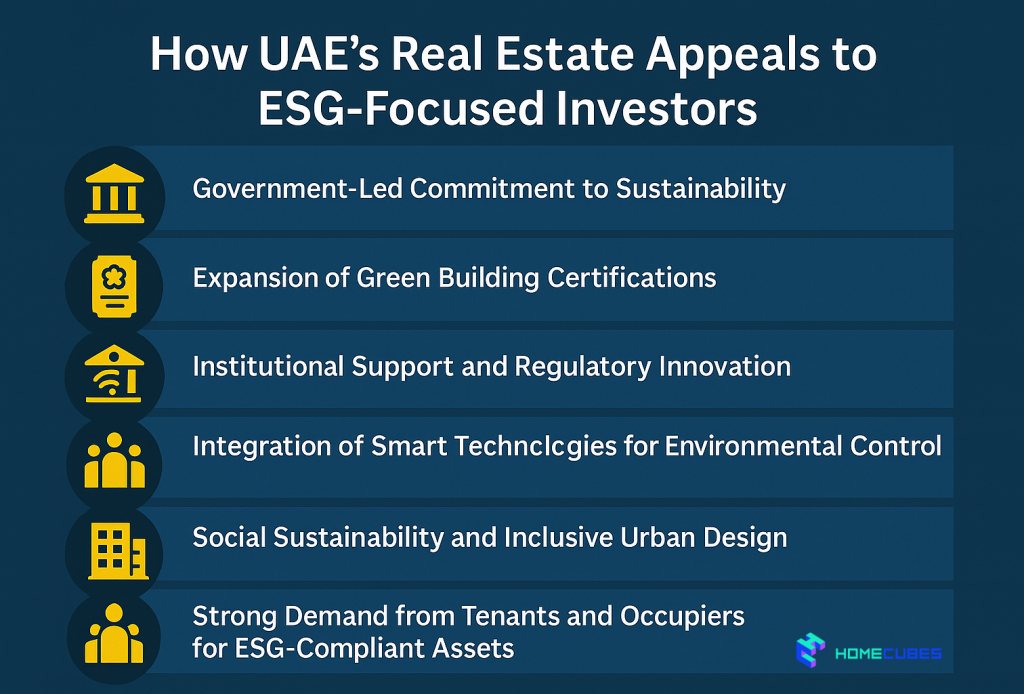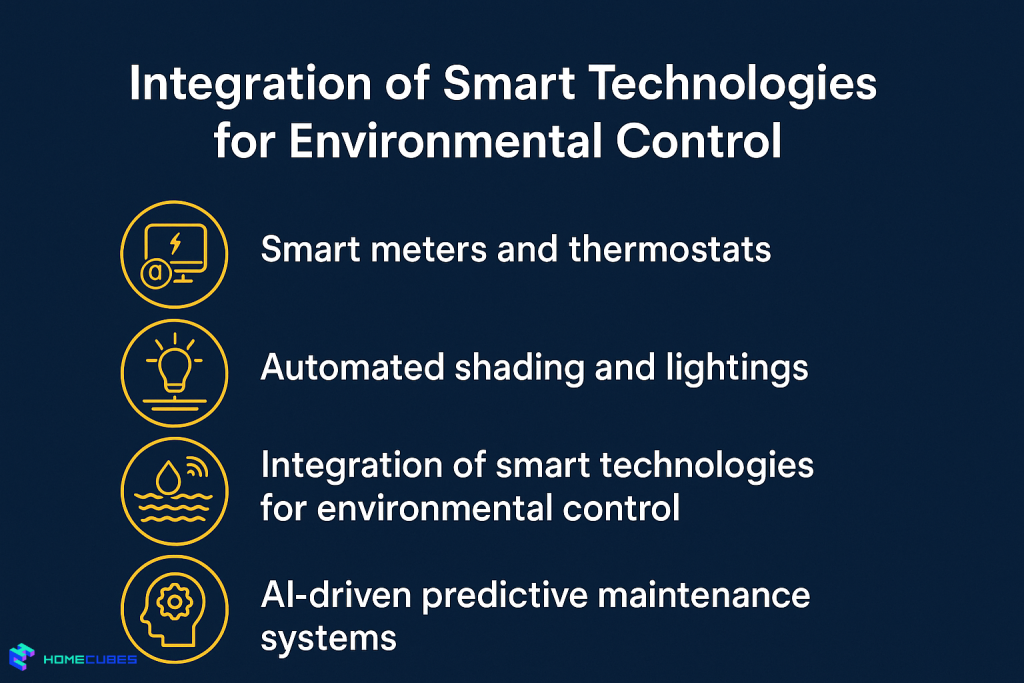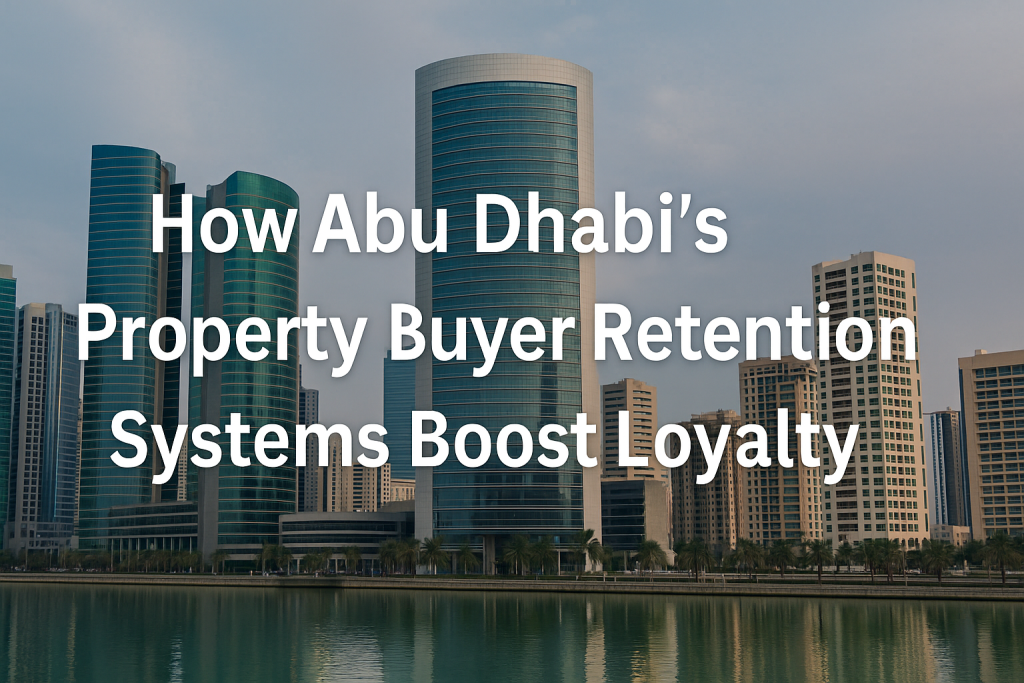

Introduction: ESG is Reshaping Global Real Estate—And UAE Is Ahead of the Curve
Environmental, Social, and Governance (ESG) principles have rapidly become non-negotiable in the investment world. For real estate, ESG not only signals ethical and sustainable development—it represents long-term asset resilience, regulatory alignment, and tenant satisfaction. In the United Arab Emirates (UAE), these principles are not being adopted reactively—they are built into the country’s urban strategy, regulatory framework, and investment pipeline.
According to the MSCI 2024 Sustainability and Climate Trends Report, institutional investors are increasingly allocating capital to regions that demonstrate climate readiness, regulatory compliance, and social inclusivity. As the UAE continues its transformation into a green economy—anchored by net-zero targets and smart infrastructure—its real estate market is gaining attention among fund managers, REITs, and individual investors who prioritize ESG-compliant portfolios.
Green investments in the GCC could create more than one million jobs by 2030.
The UAE has already committed $16.8bn to renewable energy initiatives, and I look forward to seeing how these investments benefit our nation’s real estate sector.https://t.co/jsnpLe532a pic.twitter.com/64lp7Myz17
— Ali Sajwani (@Ali_H_Sajwani) February 20, 2025
This article outlines seven compelling reasons why UAE real estate stands out for ESG-focused investors, and how these factors align with long-term global investment priorities.

Reason 1: Government-Led Commitment to Sustainability
Net-Zero Strategy and Green Infrastructure Investments
The UAE has committed to achieving net-zero carbon emissions by 2050—becoming the first nation in the MENA region to formalize such a pledge. This target is supported by landmark frameworks such as the UAE Energy Strategy 2050 and the Dubai Clean Energy Strategy, which aim to make clean energy account for 50% of total consumption by 2050.
Real estate is a core focus. Cities like Dubai and Abu Dhabi are requiring developers to incorporate green building codes, solar-ready systems, and sustainable materials into new construction.
UAE plans to invest between AED 150 and AED 200 billion by 2030 to support this transition, making real estate central to national decarbonization goals.
ESG Investors Appeal:
- Direct alignment with global climate finance mandates
- Market stability supported by state-backed climate policy
- Access to energy-efficient assets as part of a national strategy
Reason 2: Expansion of Green Building Certifications
LEED, Estidama, and WELL Becoming Norms in UAE Construction
Green certification systems are no longer niche in the UAE. Developments are increasingly designed to meet international benchmarks like LEED (Leadership in Energy and Environmental Design), Estidama Pearl Rating (specific to Abu Dhabi), and WELL Building Standards.
This shift is not just developer-driven—it’s regulatory. Dubai mandates green building standards for all new construction. Estidama, meanwhile, is required for all government buildings in Abu Dhabi and is being adopted by private developers as well.
A JLL report on sustainable buildings outlines how rising demand for green-certified assets and tightening environmental regulations globally are strengthening the business case for investment in sustainable real estate—an insight that applies directly to the UAE market.
ESG Investors Appeal:
- Easier asset classification under green REITs and ESG funds
- Lower long-term operating costs and energy footprints
- Enhanced valuation and liquidity due to ESG premiums
Reason 3: Institutional Support and Regulatory Innovation
Proactive Policies Enable ESG-Linked Investment Products
One of the UAE’s biggest advantages for ESG-focused investors is its progressive regulatory environment. The Dubai Financial Market (DFM) and Abu Dhabi Global Market (ADGM) are actively developing frameworks for sustainable finance, including green sukuks (Islamic bonds), ESG reporting standards, and climate risk disclosures.
In 2023, ADGM launched its Sustainable Finance Regulatory Framework, enabling the launch of ESG-rated real estate investment trusts (REITs) and incentivizing sustainable development through financial products.
This regulatory agility enhances the ESG Investors Appeal by taking steps to back the UAE’s zero emissions property projects and reducing entry barriers for compliant capital and ensuring high levels of transparency.
Benefits for ESG Investors:
- Ability to integrate ESG metrics into due diligence and compliance
- Confidence in long-term policy support for green investments
- Access to tax-efficient, Sharia-compliant ESG real estate instruments
Reason 4: Integration of Smart Technologies for Environmental Control
PropTech Enhances Climate Monitoring and Resource Efficiency
Modern UAE real estate is being built with climate resilience and tech integration as foundational principles and under governmental supervision and initiatives like DEWA Smart Living Program. Developers are investing in PropTech solutions that automate energy usage, reduce water waste, and monitor indoor air quality—all of which directly contribute to ESG reporting and impact measurement.

New smart buildings come equipped with:
- Smart meters and thermostats
- Automated shading and lighting
- IoT-enabled air and water quality monitoring
- AI-driven predictive maintenance systems
This digital infrastructure not only lowers operating costs—it ensures that ESG-focused investors can demonstrate measurable environmental impact.
ESG Investors Appeal:
- Availability of data-driven ESG performance analytics
- Scalability of PropTech across diverse asset types
- Integration with blockchain for secure ESG tracking
Reason 5: Social Sustainability and Inclusive Urban Design
Masterplans Focused on Livability, Access, and Diversity
In ESG, the “S”—Social—often receives less attention than environmental metrics, yet it is crucial for long-term property value. The UAE has made social sustainability a priority, especially in mixed-use developments and urban masterplans.
Communities like Dubai Sustainable City, Yas Acres, and Masdar City incorporate:
- Affordable housing quotas
- Integrated healthcare and wellness infrastructure
- Pedestrian-first layouts and green corridors
- Inclusive public spaces and community programs
This aligns with the UN Sustainable Development Goals (SDGs) and appeals to institutional investors committed to impact investing frameworks.
ESG Investors Appeal:
- Tangible social value creation metrics
- Reduced tenant turnover and higher occupancy rates
- Reputation alignment with ethical investment mandates
Reason 6: Resilience to Climate Risk and Environmental Stressors
Natural Risk Mitigation Built into Design and Planning
Unlike many other high-growth regions, the UAE is actively designing real estate to withstand climate stressors such as rising temperatures, water scarcity, and sandstorms.
Key resilience features include:
- High-performance insulation materials
- Water recycling and desalination integration
- Elevated developments in coastal zones
- Urban heat island reduction strategies (e.g., reflective roofs)
By proactively engineering resilience into its infrastructure, the UAE minimizes risk exposure—an essential consideration for long-term ESG capital.
ESG Investors Appeal:
- Lower climate adaptation costs in portfolio management
- Stability in insurance and maintenance overheads
- Future-proofed assets aligned with global risk ratings
Reason 7: Strong Demand from Tenants and Occupiers for ESG-Compliant Assets
ESG Is Becoming a Market Expectation, Not Just a Feature
A growing number of tenants—from multinational corporations to government agencies—are demanding ESG-certified office spaces, green homes, and low-carbon buildings. This tenant demand is pushing real estate developers to build, retrofit, and operate with ESG in mind.
According to the World Green Building Council, tenants in green buildings report higher satisfaction, productivity gains, and health improvements, which translates to higher retention and asset value.
ESG Investors Appeal:
- ESG assets command premium rents and lower vacancy
- Stronger lease terms and more stable income flows
- Positive brand alignment for REITs and funds with retail investors
Final Thoughts: ESG Is No Longer Optional in UAE Real Estate
As ESG compliance becomes central to global capital flows, the UAE real estate sector stands out as a model for integration, innovation, and investment readiness. From smart city masterplans and solar-powered developments to inclusive zoning and financial regulation, each pillar of ESG is actively embedded into the country’s real estate ecosystem.
For investors looking to align ethics with earnings, the UAE offers rare convergence—high-yield opportunities backed by sustainability and impact.
🌱 Interested in ESG-Compliant Fractional Real Estate Investments?
Homecubes is developing a platform for fractional ownership of ESG-aligned properties across Dubai and the UAE. Whether you’re an institutional fund or an individual investor, our goal is to help you access certified green buildings, smart rental units, and socially conscious developments.
⚠️ Please note: We are currently awaiting our regulatory license from VARA and are not yet operational.
📩 Reach out to us to be notified upon launch, and stay ahead with ESG-integrated investment opportunities in one of the world’s most forward-looking real estate markets.










